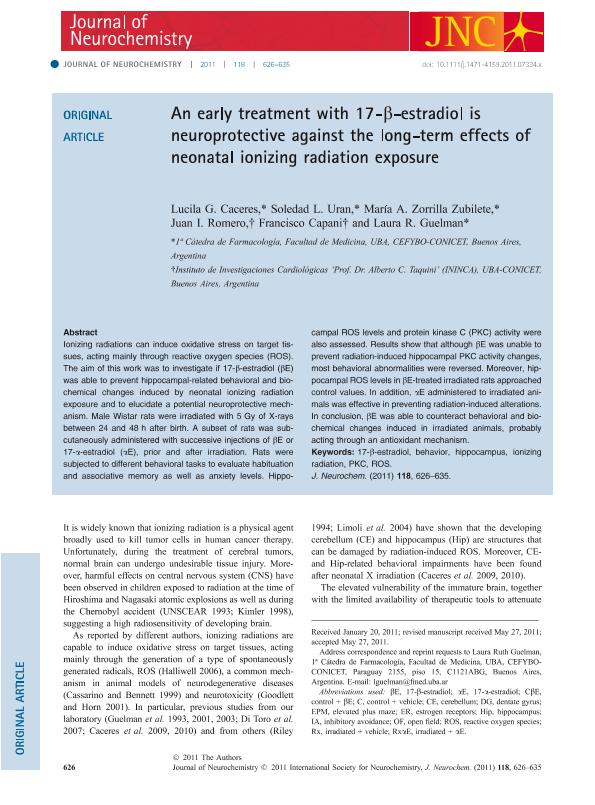Artículo
An early treatment with 17-β-estradiol is neuroprotective against the long-term effects of neonatal ionizing radiation exposure
Cáceres, Lucila Guadalupe ; Urán, Soledad Lucía
; Urán, Soledad Lucía ; Zorrilla Zubilete, María Aurelia
; Zorrilla Zubilete, María Aurelia ; Romero, Juan Ignacio
; Romero, Juan Ignacio ; Capani, Francisco
; Capani, Francisco ; Guelman, Laura Ruth
; Guelman, Laura Ruth
 ; Urán, Soledad Lucía
; Urán, Soledad Lucía ; Zorrilla Zubilete, María Aurelia
; Zorrilla Zubilete, María Aurelia ; Romero, Juan Ignacio
; Romero, Juan Ignacio ; Capani, Francisco
; Capani, Francisco ; Guelman, Laura Ruth
; Guelman, Laura Ruth
Fecha de publicación:
08/2011
Editorial:
Wiley
Revista:
Journal of Neurochemistry
ISSN:
0022-3042
e-ISSN:
1471-4159
Idioma:
Inglés
Tipo de recurso:
Artículo publicado
Clasificación temática:
Resumen
Ionizing radiations can induce oxidative stress on target tissues, acting mainly through reactive oxygen species (ROS). The aim of this work was to investigate if 17-β-estradiol (βE) was able to prevent hippocampal-related behavioral and biochemical changes induced by neonatal ionizing radiation exposure and to elucidate a potential neuroprotective mechanism. Male Wistar rats were irradiated with 5 Gy of X-rays between 24 and 48 h after birth. A subset of rats was subcutaneously administered with successive injections of βE or 17-α-estradiol (αE), prior and after irradiation. Rats were subjected to different behavioral tasks to evaluate habituation and associative memory as well as anxiety levels. Hippocampal ROS levels and protein kinase C (PKC) activity were also assessed. Results show that although βE was unable to prevent radiation-induced hippocampal PKC activity changes, most behavioral abnormalities were reversed. Moreover, hippocampal ROS levels in βE-treated irradiated rats approached control values. In addition, αE administered to irradiated animals was effective in preventing radiation-induced alterations. In conclusion, βE was able to counteract behavioral and biochemical changes induced in irradiated animals, probably acting through an antioxidant mechanism.
Palabras clave:
17-Β-Estradiol
,
Hippocampus
,
Behavior
,
Ionizing Radiation
,
Pkc
,
Ros
Archivos asociados
Licencia
Identificadores
Colecciones
Articulos(CEFYBO)
Articulos de CENTRO DE ESTUDIOS FARMACOLOGICOS Y BOTANICOS
Articulos de CENTRO DE ESTUDIOS FARMACOLOGICOS Y BOTANICOS
Articulos(ININCA)
Articulos de INST.DE INVEST.CARDIOLOGICAS (I)
Articulos de INST.DE INVEST.CARDIOLOGICAS (I)
Citación
Cáceres, Lucila Guadalupe; Urán, Soledad Lucía; Zorrilla Zubilete, María Aurelia; Romero, Juan Ignacio; Capani, Francisco; et al.; An early treatment with 17-β-estradiol is neuroprotective against the long-term effects of neonatal ionizing radiation exposure; Wiley; Journal of Neurochemistry; 118; 4; 8-2011; 626-635
Compartir
Altmétricas



